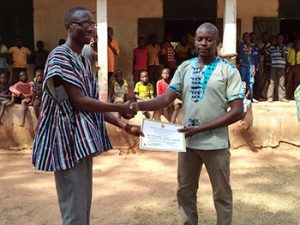Posted on January 12, 2015
By Nelson Alvarez Hernandez, a student at the NPH Leadership Institute in Seattle, after meeting Pulitzer Prize-winning author Sonia Nazario at an event co-sponsored by NPH USA and Global Washington.
What can I say? This experience started in one of our leadership meetings. I said something about an article that I read on Univision, and it talks about a social issue, migration. I was surprised by this article because this media shows quite relevant numbers about migration especially highlighting the children that every year cross the borders to find their mother that left them when they were 5 years old or less. So when Kara asked me if I wanted introduce a writer, the main question that I had in my mind was “who is Sonia Nazario?” And immediately I said yes.
Continue Reading
Posted on December 22, 2014
by Fidelis Da-uri, Field Coordinator for Literacy Bridge, a Global Washington member

Six Out of Eight Farmer’s Day Awards Go to Talking Book Users
In 2012, we had two Talking Book users win Best Farmer Awards. In 2013 there were three Talking Book users who won awards. And now we are very pleased to announce we had six Talking Book users win farming awards in 2014!
Continue Reading
Posted on December 15, 2014
By Liv Froehlich
My brother recently informed me that he had installed new disk brakes on his truck entirely by himself. Albeit an intelligent man, I knew for a fact that he had never performed such an operation before. I asked where he had suddenly gained the skills and knowhow to take apart his vehicle, to which he simply replied, “YouTube.” To my astonishment, searching “1994 Ford Ranger Disk Brake” yielded over 2,000 results, many of which were step-by-step tutorials.
We live in a day and age where, if you’re unsure of what to make for dinner, you can just search “recipes” on Pinterest and be inundated with options. While DIY crafts, home décor tips and BuzzFeed Top 20 lists may not represent technology at its finest, they are indicative of something much larger — the desire of everyday people to share their knowledge. So how does this translate to global development? It could mean a free education, the start of a small business enterprise, templates for new homes, and so much more.
Continue Reading

